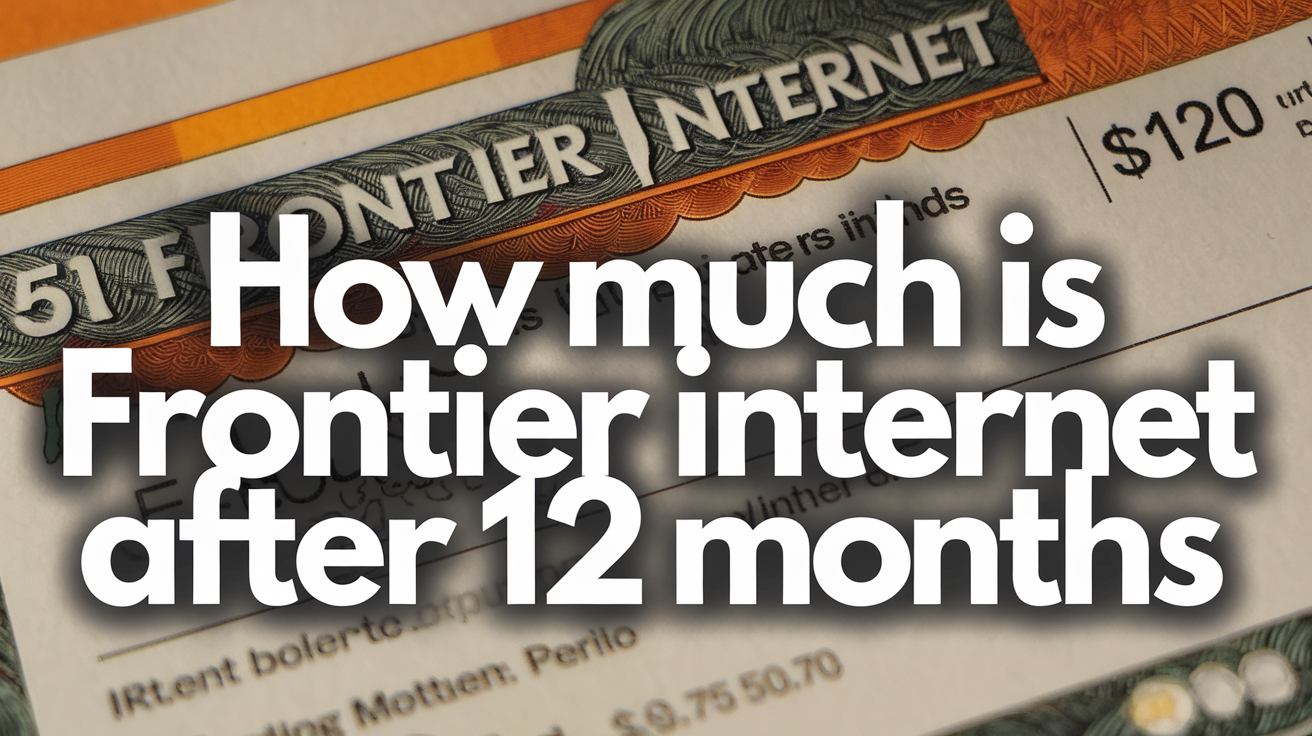A Complete Guide to Cancel Your Frontier Internet Subscription Easily

Understanding Frontier Internet Services
Frontier Communications, a significant player in the telecommunications industry, offers a range of internet services, primarily focusing on DSL and fiber optic connections across various regions of the United States. Their service areas often cater to suburban and rural communities where larger providers may have less coverage. Understanding the type of service you have with Frontier is the first step in navigating the cancellation process. Whether you're on their older DSL infrastructure or their newer, faster fiber optic network, the core principles of cancellation remain similar, though specific equipment return policies might differ.
In 2025, Frontier continues to invest in expanding its fiber optic footprint, aiming to provide higher speeds and more reliable connections. However, customer satisfaction with any internet provider can fluctuate based on individual experiences with speed, reliability, customer service, and pricing. If your personal experience with Frontier has led you to consider ending your service, this guide is designed to provide a clear, step-by-step approach to ensure a smooth and hassle-free cancellation process. We aim to demystify the procedures and equip you with the knowledge needed to avoid common pitfalls.
Reasons You Might Be Considering Canceling Frontier
The decision to cancel an internet service is rarely made lightly. Several factors can contribute to a customer's desire to switch providers or discontinue their service altogether. Understanding these common reasons can help validate your own decision and prepare you for the conversation with Frontier.
Inconsistent Speeds and Performance
One of the most frequent complaints about internet service providers, including Frontier, revolves around inconsistent speeds. Users may find that the advertised speeds are rarely met, especially during peak hours. This can be particularly frustrating for households with multiple devices streaming, gaming, or working remotely. DSL technology, while widely available, is inherently limited by distance from the central office, leading to slower speeds for many customers. Even with fiber, network congestion or equipment issues can sometimes impact performance.
High Costs and Price Increases
As with many subscription services, the cost of Frontier internet can become a point of contention. Introductory offers often expire, leading to significant price hikes that can strain household budgets. Customers may feel they are no longer receiving value for their money, especially if competing providers offer similar or better services at a lower price point. Keeping track of your billing statements and understanding your contract terms is crucial to identify when these increases occur.
Poor Customer Service Experiences
The quality of customer service is a critical component of any service provider relationship. Negative interactions with Frontier's support staff, whether through long wait times, unhelpful agents, or unresolved technical issues, can erode customer loyalty. A persistent pattern of poor customer service can be a primary driver for seeking alternatives.
Availability of Better Alternatives
The competitive landscape of internet service providers is constantly evolving. In 2025, many areas are seeing increased competition, with new providers or expanded coverage from existing ones offering superior technology (like widespread fiber) or more attractive pricing. If a competitor offers faster speeds, better reliability, or a more comprehensive package for a comparable or lower price, it's natural to consider switching.
Moving or Relocating
Perhaps the most straightforward reason to cancel is relocation. If you are moving to an area not serviced by Frontier, or if you are moving to a new residence where you will not require their services (e.g., moving in with someone who already has internet), cancellation is necessary. It's important to check if Frontier services your new address before initiating a cancellation, as transferring service might be an option.
Bundling Changes or Dissatisfaction
Frontier, like many providers, offers bundled services that might include internet, phone, or TV. If the cost or quality of the bundled services changes, or if you no longer need certain components of the bundle, you might decide to cancel the entire package or just the internet portion if it's no longer economical or satisfactory.
Technical Issues and Unreliability
Beyond just slow speeds, persistent technical issues such as frequent outages, dropped connections, or problems with equipment can make Frontier internet unreliable. If these issues are not resolved promptly and effectively by Frontier's technical support, customers may feel compelled to find a more dependable provider.
Crucial Steps Before You Cancel Frontier Internet
Before you pick up the phone or navigate to Frontier's cancellation portal, taking a few preparatory steps can save you time, money, and frustration. These steps are designed to ensure you understand your contract, are aware of potential fees, and have a plan for your next internet service.
Review Your Contract and Billing Statements
Understand Early Termination Fees (ETFs): Many internet service contracts include clauses for early termination fees if you cancel before the contract's end date. These fees can be substantial. Carefully review your original service agreement or recent billing statements to determine if you are under contract and what the ETF might be. In 2025, many providers are moving towards month-to-month agreements, but it's always wise to check.
Identify Contract End Date: If you are within your contract term, knowing the exact end date can help you avoid ETFs. Canceling on or after this date will typically mean no penalty.
Check for Hidden Fees: Beyond ETFs, be aware of any other potential charges, such as unreturned equipment fees or final prorated service charges. Your billing statement is the best place to start looking for these details.
Research Alternative Internet Providers
Identify Available Services in Your Area: Use online tools or contact local providers to see what internet options are available at your address. Consider fiber, cable, and fixed wireless services. Websites like BroadbandNow can be helpful resources in 2025 for comparing plans and availability.
Compare Speeds, Pricing, and Contracts: Look at download and upload speeds, monthly costs, any installation fees, and contract terms. Make sure the alternatives meet your household's needs for streaming, gaming, and work.
Read Reviews: Check recent customer reviews for alternative providers to gauge their reliability and customer service quality.
Gather Necessary Information
Account Number: Have your Frontier account number readily available. This is usually found on your monthly bill.
Contact Information: Ensure you have the correct phone number and email address associated with your account.
Security PIN/Password: Some providers require a security PIN or password to verify your identity when making account changes. Check your account details or previous correspondence for this information.
Prepare for Equipment Return
Identify Frontier-Owned Equipment: Determine which equipment you are renting from Frontier. This typically includes modems, routers, and potentially set-top boxes if you have TV service. Your bill should list rented equipment.
Understand Return Procedures: Frontier usually provides specific instructions on how to return their equipment. This might involve dropping it off at a designated location or shipping it back using a prepaid label. Failure to return equipment on time or in good condition can result in significant charges.
Document Equipment Condition: Before returning, take photos or videos of the equipment to document its condition. This can be useful if Frontier later claims the equipment was damaged.
Consider the Timing of Your Cancellation
Billing Cycle: Frontier's billing cycles can impact your final bill. Canceling at the end of a billing cycle might prevent you from being charged for a full month of service you won't use. However, some providers prorate the final bill, so clarify this with Frontier.
Service Interruption: Plan your cancellation date to minimize the time you are without internet service, especially if you rely on it for work or essential communication.
Methods to Cancel Your Frontier Internet Subscription
Frontier Communications offers several avenues for customers to initiate the cancellation of their internet service. While the most common and often recommended method is by phone, other options may be available depending on your location and the specific policies in place in 2025. It's crucial to use the method that provides the clearest record of your request.
1. Canceling by Phone (Most Common and Recommended)
This is typically the most direct and effective way to cancel your Frontier internet service. It allows for immediate confirmation and the opportunity to ask questions about final bills, equipment returns, and potential fees.
Steps:
- Find the Right Number: Locate the customer service or cancellation department number for Frontier. This is usually found on your bill, on Frontier's official website, or through a quick online search for "Frontier customer service number." As of 2025, the primary customer service number is often the best starting point.
- Be Prepared: Have your account number, security PIN (if applicable), and a list of questions ready.
- Be Polite but Firm: Clearly state your intention to cancel your internet service. While customer service representatives may try to retain you with offers, be polite but firm in your decision.
- Confirm Details: Ask for confirmation of your cancellation date, any outstanding balance, the amount of your final bill, and the process for returning equipment.
- Get a Confirmation Number: Crucially, request and record a cancellation confirmation number or reference number. This serves as proof that you initiated the cancellation process. Note the date and time of your call and the name of the representative you spoke with.
2. Canceling via Frontier's Online Portal (If Available)
Some service providers are increasingly offering online cancellation options. While not always as comprehensive as a phone call, it can be a convenient method if available and properly documented.
Steps:
- Log In to Your Account: Visit the Frontier website and log in to your online account portal.
- Navigate to Account Settings: Look for sections like "My Account," "Account Management," "Billing," or "Service Changes."
- Find Cancellation Option: Search for an option related to canceling service, closing an account, or ending your subscription.
- Follow Prompts: If an online cancellation option is available, follow the on-screen instructions carefully. You may be asked to provide a reason for cancellation and confirm details.
- Seek Confirmation: Ensure you receive an email confirmation or a confirmation number for your cancellation request. If no confirmation is provided, it's advisable to follow up with a phone call.
Note: As of 2025, a fully automated online cancellation process might not be universally available for all Frontier customers. It's always best to check your account or contact customer service to confirm this option.
3. Canceling by Mail (Least Recommended, Use as a Last Resort)
Sending a cancellation request via certified mail provides a paper trail but is generally the slowest and least interactive method. It's often used when other methods have failed or as a supplementary step to a phone cancellation.
Steps:
- Draft a Formal Letter: Write a clear and concise letter stating your intention to cancel your Frontier internet service. Include your full name, service address, account number, and contact phone number.
- Specify Cancellation Date: Clearly state the desired date of cancellation.
- Request Confirmation: Ask for written confirmation of your cancellation and the final billing details.
- Send via Certified Mail: Mail the letter to Frontier's customer service or billing department. Use certified mail with a return receipt requested. This provides proof that Frontier received your letter and the date of receipt.
- Follow Up: Allow ample time for Frontier to process the request and respond. If you do not receive confirmation within a reasonable period (e.g., 7-10 business days), follow up by phone.
Frontier's official mailing address for customer service can be found on their website or your billing statement.
4. Canceling in Person (Rarely Available)
In some rare instances, Frontier might have physical retail locations where customers can conduct account management. However, for internet service cancellations, this is typically not a common or available option in 2025.
Key Considerations for All Methods:
- Be Patient: Cancellation processes can sometimes take time.
- Keep Records: Save all correspondence, confirmation numbers, and notes from phone calls.
- Document Everything: This is your best defense against billing disputes or unreturned equipment charges.
What to Expect During and After Cancellation
Understanding the post-cancellation process can help you manage expectations and avoid surprises. Frontier, like any service provider, has established procedures for winding down your account and settling any outstanding matters.
Final Billing and Proration
Your final bill from Frontier will typically include charges up to your cancellation date. Depending on Frontier's policy and when you cancel within your billing cycle, your final bill might be prorated. This means you may be charged only for the days you used the service in the final billing period, or you might be billed for the full cycle up to the cancellation date.
What to look for:
- Service Charges: Ensure the service charges reflect the correct cancellation date.
- Equipment Fees: Check for any charges related to unreturned or damaged equipment.
- Early Termination Fees (ETFs): If you canceled before your contract ended, the ETF should be clearly itemized.
- One-Time Charges: Be aware of any other miscellaneous fees.
It is advisable to review this final bill carefully against the information you received during your cancellation call or online confirmation.
Equipment Return Process
This is a critical step that many customers overlook, leading to unexpected charges. Frontier requires customers to return any rented equipment, such as modems, routers, or set-top boxes, to avoid substantial fees.
Typical Process:
- Notification: Frontier will usually send instructions on how and where to return the equipment. This might be via email or a notice included with your final bill.
- Packaging: Pack the equipment securely, preferably in its original packaging if available.
- Shipping or Drop-off: You will likely be provided with a prepaid shipping label to send the equipment back, or you may need to drop it off at a designated carrier location (e.g., UPS Store, FedEx). Some areas might have specific Frontier service centers for returns.
- Tracking: If shipping, keep the tracking number as proof of return.
- Timeliness: Adhere to the specified return deadline. Failure to return equipment within the given timeframe can result in charges for the full replacement cost of the devices.
In 2025, many providers are streamlining this process to be more customer-friendly, but diligence on the customer's part is still essential.
Service Interruption
Once your cancellation is processed and confirmed, your Frontier internet service will be disconnected. The exact timing of this disconnection will depend on the cancellation date you agreed upon with Frontier. If you are switching to a new provider, it's wise to schedule your new service installation to coincide closely with your Frontier disconnection to minimize downtime.
Account Closure and Data Retention
Your Frontier account will be officially closed after the final billing period and all outstanding balances are settled. Frontier, like other companies, has policies regarding data retention for customer accounts, typically for a specified period for legal and record-keeping purposes. This does not typically affect your ability to obtain new services from other providers.
Potential for Service Issues with New Provider
While not directly related to Frontier's cancellation, it's worth noting that transitioning to a new provider can sometimes involve its own set of challenges. Ensure your new installation is scheduled correctly and that the new equipment is functioning as expected before you consider the Frontier cancellation fully complete.
Credit Reporting
If you have any outstanding balances with Frontier after cancellation, these can be reported to credit bureaus, potentially affecting your credit score. Ensure your final bill is paid promptly to avoid any negative impact on your credit history.
Exploring Alternatives to Frontier Internet
The decision to leave Frontier often stems from a desire for better service, lower prices, or more advanced technology. Fortunately, the internet service provider market is diverse, and numerous alternatives exist. In 2025, the options available will depend heavily on your specific geographic location.
Fiber Optic Internet Providers
Fiber optic internet is the gold standard for speed, reliability, and symmetrical upload/download speeds. If Frontier offers fiber in your area, it's a strong contender. However, if you're looking to switch from Frontier's DSL or even their fiber to a different fiber provider, consider these major players and regional providers:
- Verizon Fios: Available in select East Coast markets, known for high speeds and reliability.
- AT&T Fiber: Expanding rapidly across many states, offering competitive speeds and pricing.
- Google Fiber: Available in a growing number of cities, offering excellent performance.
- Local Fiber Companies: Many smaller, community-based providers are deploying fiber networks, often offering great service and local support.
Fiber offers a significant upgrade over DSL and is often comparable to or better than cable in terms of performance.
Cable Internet Providers
Cable internet providers use the same coaxial cable network that delivers cable television. They typically offer high download speeds, though upload speeds are often much lower than download speeds.
- Xfinity (Comcast): One of the largest cable providers in the U.S., offering a wide range of plans and speeds.
- Spectrum (Charter Communications): Another major cable provider with extensive coverage.
- Cox Communications: Serves various regions, offering competitive cable internet packages.
Cable internet is a solid choice for most households, especially for streaming and general internet use, but fiber is generally preferred for demanding applications like large file uploads or professional video conferencing.
5G Home Internet and Fixed Wireless
With the expansion of 5G networks and advancements in fixed wireless technology, these options are becoming increasingly viable, especially in areas where traditional wired infrastructure is limited.
- Verizon 5G Home Internet: Offers high-speed internet access wirelessly in eligible areas.
- T-Mobile 5G Home Internet: Another major player in the 5G home internet space, known for its competitive pricing.
- Starry Internet: Utilizes fixed wireless technology to provide broadband in select urban and suburban areas.
- Local Fixed Wireless Providers: Numerous smaller companies offer fixed wireless solutions, often using high-frequency radio waves to connect homes to a nearby tower.
These services can be a great alternative to DSL or satellite, offering speeds that can rival cable in some cases. Reliability can sometimes be affected by weather or line-of-sight obstructions.
Satellite Internet
Satellite internet is often the only option for very remote or rural areas not served by other technologies. However, it typically comes with higher latency, lower speeds, and data caps.
- HughesNet: One of the primary satellite internet providers, offering service nationwide.
- Viasat: Another major satellite provider with similar service characteristics to HughesNet.
- Starlink (SpaceX): This newer satellite internet service offers significantly lower latency and higher speeds than traditional satellite providers, making it a more competitive option, though availability and pricing can vary.
While Starlink is a game-changer, traditional satellite services are generally best suited for basic internet needs due to their inherent limitations.
Comparing Your Options: A Snapshot (2025)
Here's a simplified comparison to help you weigh your choices:
| Provider Type | Typical Speeds (Download/Upload) | Latency | Best For | Considerations |
|---|---|---|---|---|
| Fiber Optic | 100 Mbps - 10 Gbps / 100 Mbps - 10 Gbps | Very Low | Gaming, 4K Streaming, Large Uploads, Heavy Multi-User Households | Availability is limited; can be more expensive |
| Cable | 50 Mbps - 1 Gbps / 10 Mbps - 50 Mbps | Low to Medium | Streaming, General Browsing, Moderate Gaming | Upload speeds are often asymmetrical; can experience congestion |
| 5G Home / Fixed Wireless | 50 Mbps - 300 Mbps / 10 Mbps - 50 Mbps | Low to Medium | General Use, Streaming, Households Needing an Alternative to DSL | Performance can vary with signal strength and network congestion; requires clear line of sight for fixed wireless |
| DSL (Frontier's older tech) | 5 Mbps - 100 Mbps / 1 Mbps - 10 Mbps | Medium to High | Basic Browsing, Email, Light Streaming | Speed degrades with distance from hub; generally slower than others |
| Satellite (Traditional) | 25 Mbps - 100 Mbps / 1 Mbps - 3 Mbps | Very High | Extremely Rural Areas | High latency, data caps, weather interference, often expensive |
| Satellite (Starlink) | 50 Mbps - 250 Mbps / 5 Mbps - 20 Mbps | Low to Medium | Rural Areas Seeking Better Performance than Traditional Satellite | Requires clear sky view, can have intermittent outages, equipment cost |
When comparing, always look at the *advertised* speeds versus the *typical* or *advertised maximum* speeds, and pay close attention to data caps and contract terms. Remember to check availability for your specific address.
Conclusion: A Smooth Transition from Frontier
Canceling your Frontier internet subscription doesn't have to be a daunting task. By understanding your contract, preparing your account information, and choosing the right cancellation method, you can ensure a seamless transition. Remember to review your final bill meticulously, return all rented equipment promptly to avoid charges, and have your new internet service lined up to minimize any disruption. In 2025, the internet service provider landscape offers more choices than ever, so taking the time to research alternatives that best fit your needs and budget is a worthwhile endeavor.
We've walked through the essential steps: from identifying why you might be canceling and preparing your account, to the actual methods of cancellation and what to expect afterward. Whether you're moving to a new provider with faster fiber speeds, a more reliable cable connection, or exploring newer technologies like 5G home internet, making an informed decision is key. Keep your records, be clear in your communication with Frontier, and embrace the opportunity to upgrade your home internet experience. This guide aims to empower you with the knowledge to navigate this process with confidence, ensuring you leave Frontier on favorable terms and step into a better internet future.




